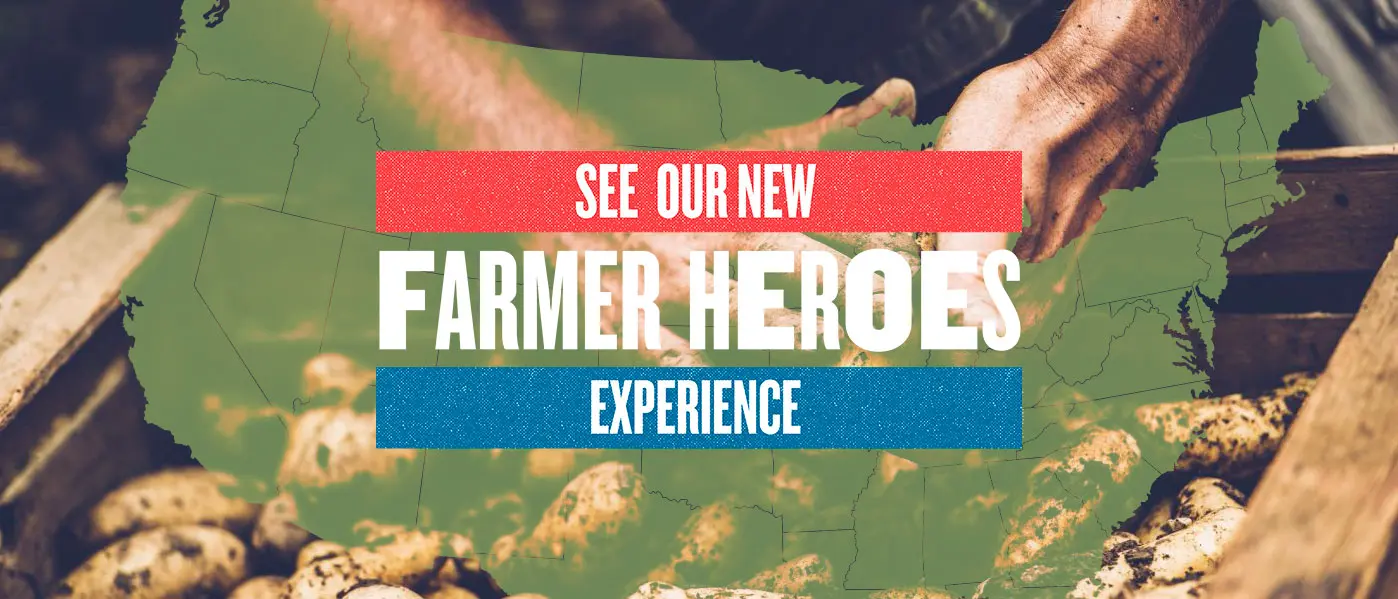The concentration of market power into the hands of very few corporations defines nearly every farming sector in the U.S., continuing to push family farmers off the land while corporations gain power and influence over our food system. But the situation is perhaps most severe in the poultry industry, where farmers are all but serfs in a feudal economic system that funnels profits to corporate integrators. The Crutchfields have watched many of their friends endure the same hardships they suffered, often losing their farms as a result—a fate Karen and Mitchell hope to avoid.
So what does corporate power look like? Below, we highlight the Crutchfields’ story plus two other stories of farm families in Arkansas who also raised chickens under contract with Tyson. Unfortunately, the stories they tell are similar to ones we’ve been hearing on the Farm Aid hotline for years. We’ll continue working until family farmers have justice.
Karen and Mitchell Crutchfield
Karen and Mitchell Crutchfield have farming ingrained in their DNA. They both grew up in farm families before inheriting 13 acres of land in Arkansas from Karen’s grandfather in 1978. Since then, the two expanded their land to 42 acres, now named Granny Creek Farm. “We’re people that just love the farm and love the land,” says Mitchell.
The Crutchfields currently raise cows and pigs in addition to selling timber from their tree farm, but their roots lay in poultry, which they raised for 25 years, until the demands of their poultry integrator pushed them out of the business last year
Life Under Contract
When Karen and Mitchell got married in 1987, they decided to build two chicken houses to grow broiler chickens. They thought raising chickens would be a way for Karen to work while raising their three children at home. In 1990, the Crutchfields added a third chicken house, and in 1999 and 2000 they added three more houses in order to raise poultry for Tyson Foods, Inc.
The couple describes a family farm as something to pass down from generation to generation, as a way to contribute to society through the land. They think of a family farm as a place to live, raise children and hopefully make a living on, but that it can be a struggle with Tyson being such a powerful company (it’s Arkansas’s third-largest public company). The Crutchfields believe a corporation with that kind of financial clout has incredible influence in the political sphere, a reality that can render a family farmer powerless.
The scenario is not atypical in the U.S poultry industry, where large corporations called “integrators” contract with poultry growers. The integrator provides a grower with the chicks, feed, medication and technical advisors to supervise farm production. The company retains ownership of the birds and expects producers to grow their flocks under very specific management programs, often requiring growers to make expensive investments in housing facilities and equipment to raise their birds. At the end of the growing period, the company picks up the flock and pays the farmer per pound.
Poultry contracts, written by the integrators, grant companies substantial power over the grower. In the 25 years that Karen and Mitchell raised poultry for Tyson, their compensation rate remained steady at under 5 cents per pound, yet they were required to continually make improvements to and modernize their facilities, keeping them in a constant state of debt. Last year, Tyson required the couple to install new computerized blackout houses, an update that would have cost upwards of $300,000. “They control what you do and we finally said no,” Karen recalls. “At that point, the cost it would have taken to update would have been like buying the farm again.”
“I’d like to see the farmers treated equally, where they can make a living instead of the big man getting everything and the growers getting just enough to get by.”
Tyson stopped sending chicks to the Crutchfields in March of 2012, and the Crutchfields decided to take action. Karen found Danielle Diamond, an attorney, and Terry Spence, a family farm advocate, both affiliated with the Socially Responsible Agricultural Project. When their creditor was prepared to take their land, Danielle and Terry helped the Crutchfields team up with an all-star lineup of attorneys and experts in food, farm and consumer rights organizations in the country. Soon the team was able to help Karen and Mitchell secure a local attorney, Todd Hertzburg of Fayetteville, to represent them in a Chapter 12 bankruptcy proceeding in order to save their home and farm. Early on, Farm Aid’s farm advocate Joel Morton gave them guidance and continues to be a source of support.
Though the future is uncertain, Karen and Mitchell are reaching out to other growers who have been dropped by their integrators and face losing their farms, encouraging them to share their stories. Noting the vital importance of America’s poultry growers, Karen said, “We’re working to try to get not just us, but a lot of other people around us, help.”
Randy James
A third generation farmer in Hagarville, Arkansas, Randy James lives just a mile down the road from his childhood home. Today, he is a cattle farmer on the same farmland that his father had worked since the 1940s.
Before farming on his own, Randy graduated school with an accounting degree and saved up money for years. In 1985, the farmland his family rented went up for sale and he jumped on the opportunity to buy the 500 acres. Beginning by raising cattle in his father’s footsteps, he decided to build James Farm’s first poultry facilities for additional income, signing a contract with Tasty-bird in 1987.
Reflecting back on it now, Randy could have never predicted how his farming career—something he always considered a dream job—would pan out.
A Turn for the Worse
Tasty-bird was the only integrator in the area where Randy could market his birds, but the company changed hands numerous times before Tyson took control. “The earlier integrators were pretty good,” Randy recalls, “but Tyson was mostly pro-Tyson and the longer I grew for them, the more apparent it became that the grower was the last person that was taken care of.”
Randy’s wages under his contract with Tyson were based on the square footage of his chicken houses, which meant that the number of birds he raised didn’t matter. After 15 years of growing the same number of birds, Tyson started demanding that he grow more without any increase in wages, essentially granting Tyson thousands of extra birds for free.
His old chicken houses were not equipped to hold the extra chickens Tyson wanted, so Randy understood when the company asked him to upgrade. Though expensive, he adhered to the demands, adding new water lines, feed lines and fans without any increase in pay. In cooler temperatures, chickens are known to eat more, so to cut down on the company’s feeding costs, Tyson required Randy to add new heaters in the chicken houses at his own expense.
Tyson would also exert its power by holding out for a longer period of time between flocks, leaving Randy without pay. Before Tyson asked Randy to increase his flock size, there were about two weeks in between each flock. Under the new guidelines, Tyson left Randy without any chickens for six week intervals.
At 60 years old, Randy had finally had enough. He refused to make the pricey investments and quit in 2007, knowing that it would spell his farm’s demise.
“They just took advantage of us,” Randy says. “They provided us a bird and an income, but it was their way or the highway and I think their record is pretty obvious. Question any grower. I don’t think anybody is real satisfied with them after they bought the business from Tasty-bird.”
Now focusing solely on raising his cattle, Randy reflects on the importance of a competitive marketplace for contract poultry growers. Without true competition, the corporation retains all the power, leaving the family farmer with two options: fall in line with the corporation or quit the business.
Lavania Hale
With the help of her three children, Lavania Hale raised chickens for 30 years on her 20-acre family farm in Arkansas. While she occasionally raised cows or hogs, Lavania’s primary business was growing chickens.
Two years ago, the Hales retired the farm after Lavania needed eye surgery and Devaughn, who primarily worked off the farm, suffered from arthritis that prevented him from farm work. But it had only been a matter of time anyway; 20 years of low wages from Tyson had long created hardship for the Hales.
In fact, in those twenty years Lavania had only received one raise, which made it increasingly difficult to turn a profit on her chickens. And then, there were the costly upgrades. Whereas Lavania would typically control the temperature in the chicken houses by dropping curtains, which saved energy and money,Tyson’s standards meant the Hales had to run either heat or fans at all times. Tyson also continually requested expensive upgrades, like blackout houses.
Market Manipulators
In Lavania’s view, the constant upgrades were merely a ploy to cull older farmers from the company. “A family farm means a farm you could run and expect that when you do retire, you could pass it down to your children, instead of having to close it down.” She says that if she and Devaughn were to pass the farm on to their children, it would have been cheaper for them to start from scratch to meet Tyson’s demands rather than incurring debts from continual upgrades.
Lavania contends that the current system is unfair to the grower, making it impossible to sell a product independent of a large integrator like Tyson. That puts a small family farm completely in the hands of the company, a situation that lends itself to abusive practices and significant debts for farmers.
Further Reading
For more information on the sorry state of the contract poultry industry in the U.S. and its affect on family farmers, read our look at the poultry industry and explore how chicken ends up on our plates.




